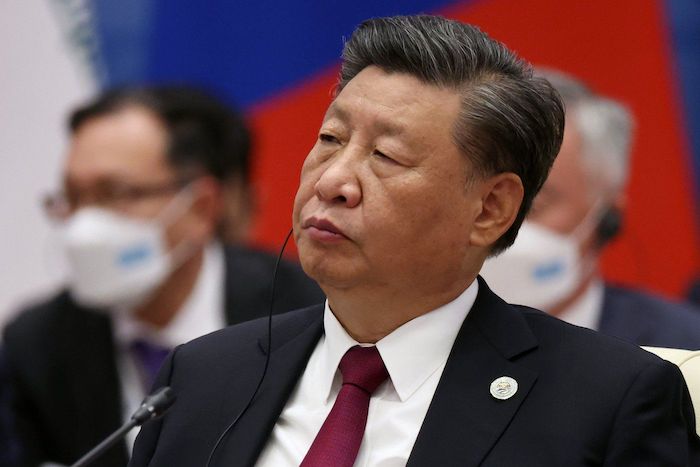Business
China’s Richest Are Desperate To Get Their Fortunes Out Of The Country By Any Means Necessary

From the Daily Caller News Foundation
China’s wealthiest citizens are resorting to dubiously legal methods to get their money out of the country as economic turmoil and a failing property market loom over the nation, according to the Wall Street Journal Wednesday.
The richest in the country are using various methods to circumvent the $50,000 foreign exchange limit, such as buying cryptocurrency, paintings or overpaying for imports among other methods, according to the WSJ. From the last half of 2023 to June this year, over $250 billion in assets has left the country, according to a WSJ analysis of Census and Economic Information Center data.
“Five or 10 years ago if you were a Chinese person you could put your money in real estate and have a way of growing your wealth,” Martin Rasmussen, senior strategist at research firm Exante Data told the WSJ. “That is not by any means attractive anymore.”
A similar outflow occurred in 2015 and 2016, with Chinese citizens purchasing over $200 billion in foreign assets, according to the WSJ in 2016.
China’s economic growth is projected to slow down by 4.5% in 2025, according to the International Monetary Fund (IMF) in May. The “ongoing housing market correction” is a large part of the economic downturn, as an estimated $18 trillion in value was wiped from the sector since 2021, according to the WSJ.
Top Chinese developer Evergrande was ordered to be liquidated in January by a Hong Kong court after it failed to restructure in the face of more than $300 billion in liabilities. Before the company’s collapse, China was already projected to hemorrhage at least $65 billion to foreign investments, with the Evergrande collapse accelerating the capital movement.
Beijing is publicly making examples of people it catches using illicit methods to transfer capital overseas, such as one group featured on state TV network CCTV that reportedly helped move $112 million worth of Chinese Yuan, according to the WSJ. The State Administration of Foreign Exchange also publishes records of people punished for violating its controls publicly.
Punishments usually include fines around half of the amount illegally transferred, or sometimes criminal charges, according to the WSJ.
Even for China’s ultra-rich with overseas connections, it’s getting harder to evade the government’s crackdown on capital leaving the nation, private bankers told the WSJ. The flight signals a lack of confidence in the economy as Chinese lawmakers feel the pressure to stabilize the currency and manage an aging population.
One method involves buying paintings to be sold in Hong Kong at an auction, but keeping the profit from the sale in U.S. currency on an offshore account based in the city, where the mainland’s capital controls don’t apply, according to the WSJ.
Newer methods to transport currency utilize cryptocurrency, which is bought by a third-party facilitator, stored on hard drives then converted to dollars overseas, according to the WSJ. While China banned crypto trading in 2021, crypto wallets are still allowed.
Business
Bank of Canada governor warns citizens to anticipate lower standard of living

From LifeSiteNews
“Unless something changes, our incomes will be lower than they otherwise would be.”
Bank of Canada Governor Tiff Macklem gave a grim assessment of the state of the economy, essentially telling Canadians that they should accept a “lower” standard of living.
In an update on Wednesday in which he also lowered Canada’s interest rate to 2.25 percent, Macklem gave the bleak news, which no doubt will hit Canadian families hard.
“What’s most concerning is, unless we change some other things, our standard of living as a country, as Canadians, is going to be lower than it otherwise would have been,” Macklem told reporters.
“Unless something changes, our incomes will be lower than they otherwise would be.”
Macklem said what Canada is going through “is not just a cyclical downturn.”
Asked what he meant by a “cyclical downturn,” Macklem blamed what he said were protectionist measures the United States has put in place such as tariffs, which have made everything more expensive.
“Part of it is structural,” he said, adding, “The U.S. has swerved towards protectionism.”
“It is harder to do business with the United States. That has destroyed some of the capacity in this country. It’s also adding costs.”
Macklem stopped short of saying out loud that a recession is all but inevitable but did say growth is “pretty close to zero” at the moment.
While some U.S. protectionist measures put in place by President Donald Trump have impacted Canada, the reality is that since the Liberals took power in 2015, first under former Prime Minister Justin Trudeau and now under Mark Carney, government spending has been out of control, according to experts. Rising inflation is rampant.
Canadian taxpayers are already dealing with high inflation and high taxes, in part due to the Liberal government overspending and excessive money printing, and even admitting that giving money to Ukraine comes at the “taxpayers’” expense.
As reported by LifeSiteNews, Carney boldly proclaimed earlier this week that his Liberal government’s upcoming 2025 budget will include millions more in taxpayer money for “SLGBTQI+ communities” and “gender” equality and “pride” safety.
As reported by LifeSiteNews, the Canadian Taxpayers Federation (CTF) recently blasted the Carney government for spending $13 million on promotional merchandise such as “climate change card games,” “laser pens and flying saucers,” and “Bamboo toothbrushes” since 2022.
Canadians pay some of the highest income and other taxes in the world. As reported by LifeSiteNews, Canadian families spend, on average, 42 percent of their income on taxes, more than food and shelter costs. Inflation in Canada is at a high not seen in decades.
Business
Canada’s economic performance cratered after Ottawa pivoted to the ‘green’ economy

From the Fraser Institute
By Jason Clemens and Jake Fuss
There are ostensibly two approaches to economic growth from a government policy perspective. The first is to create the best environment possible for entrepreneurs, business owners and investors by ensuring effective government that only does what’s needed, maintains competitive taxes and reasonable regulations. It doesn’t try to pick winners and losers but rather introduces policies to create a positive environment for all businesses to succeed.
The alternative is for the government to take an active role in picking winners and losers through taxes, spending and regulations. The idea here is that a government can promote certain companies and industries (as part of a larger “industrial policy”) better than allowing the market—that is, individual entrepreneurs, businesses and investors—to make those decisions.
It’s never purely one or the other but governments tend to generally favour one approach. The Trudeau era represented a marked break from the consensus that existed for more than two decades prior. Trudeau’s Ottawa introduced a series of tax measures, spending initiatives and regulations to actively constrain the traditional energy sector while promoting what the government termed the “green” economy.
The scope and cost of the policies introduced to actively pick winners and losers is hard to imagine given its breadth. Direct spending on the “green” economy by the federal government increased from $600 million the year before Trudeau took office (2014/15) to $23.0 billion last year (2024/25).
Ottawa introduced regulations to make it harder to build traditional energy projects (Bill C-69), banned tankers carrying Canadian oil from the northwest coast of British Columbia (Bill C-48), proposed an emissions cap on the oil and gas sector, cancelled pipeline developments, mandated almost all new vehicles sold in Canada to be zero-emission by 2035, imposed new homebuilding regulations for energy efficiency, changed fuel standards, and the list goes on and on.
Despite the mountain of federal spending and regulations, which were augmented by additional spending and regulations by various provincial governments, the Canadian economy has not been transformed over the last decade, but we have suffered marked economic costs.
Consider the share of the total economy in 2014 linked with the “green” sector, a term used by Statistics Canada in its measurement of economic output, was 3.1 per cent. In 2023, the green economy represented 3.6 per cent of the Canadian economy, not even a full one-percentage point increase despite the spending and regulating.
And Ottawa’s initiatives did not deliver the green jobs promised. From 2014 to 2023, only 68,000 jobs were created in the entire green sector, and the sector now represents less than 2 per cent of total employment.
Canada’s economic performance cratered in line with this new approach to economic growth. Simply put, rather than delivering the promised prosperity, it delivered economic stagnation. Consider that Canadian living standards, as measured by per-person GDP, were lower as of the second quarter of 2025 compared to six years ago. In other words, we’re poorer today than we were six years ago. In contrast, U.S. per-person GDP grew by 11.0 per cent during the same period.
Median wages (midpoint where half of individuals earn more, and half earn less) in every Canadian province are now lower than comparable median wages in every U.S. state. Read that again—our richest provinces now have lower median wages than the poorest U.S. states.
A significant part of the explanation for Canada’s poor performance is the collapse of private business investment. Simply put, businesses didn’t invest much in Canada, particularly when compared to the United States, and this was all pre-Trump tariffs. Canada’s fundamentals and the general business environment were simply not conducive to private-sector investment.
These results stand in stark contrast to the prosperity enjoyed by Canadians during the Chrétien to Harper years when the focus wasn’t on Ottawa picking winners and losers but rather trying to establish the most competitive environment possible to attract and retain entrepreneurs, businesses, investors and high-skilled professionals. The policies that dominated this period are the antithesis of those in place now: balanced budgets, smaller but more effective government spending, lower and competitive taxes, and smart regulations.
As the Carney government prepares to present its first budget to the Canadian people, many questions remain about whether there will be a genuine break from the policies of the Trudeau government or whether it will simply be the same old same old but dressed up in new language and fancy terms. History clearly tells us that when governments try to pick winners and losers, the strategy doesn’t lead to prosperity but rather stagnation. Let’s all hope our new prime minister knows his history and has learned its lessons.
-

 Crime1 day ago
Crime1 day agoCanada Seizes 4,300 Litres of Chinese Drug Precursors Amid Trump’s Tariff Pressure Over Fentanyl Flows
-

 Alberta19 hours ago
Alberta19 hours agoFrom Underdog to Top Broodmare
-

 Alberta1 day ago
Alberta1 day agoHow one major media torqued its coverage – in the take no prisoners words of a former Alberta premier
-

 Bruce Dowbiggin2 days ago
Bruce Dowbiggin2 days agoGet Ready: Your House May Not Be Yours Much Longer
-

 Alberta1 day ago
Alberta1 day agoProvince orders School Boards to gather data on class sizes and complexity by Nov 24
-

 Business2 days ago
Business2 days agoCanada’s attack on religious charities makes no fiscal sense
-

 Business2 days ago
Business2 days agoWhen Words Cook the Books: The Politics of ‘Investment-Speak’
-

 Opinion1 day ago
Opinion1 day agoBill Gates Shakes Up the Climate Discussion





